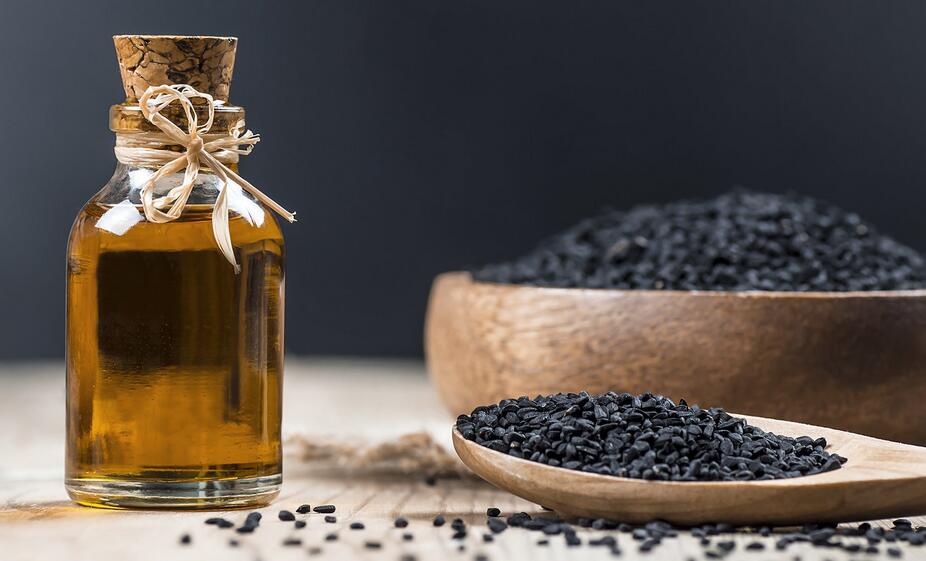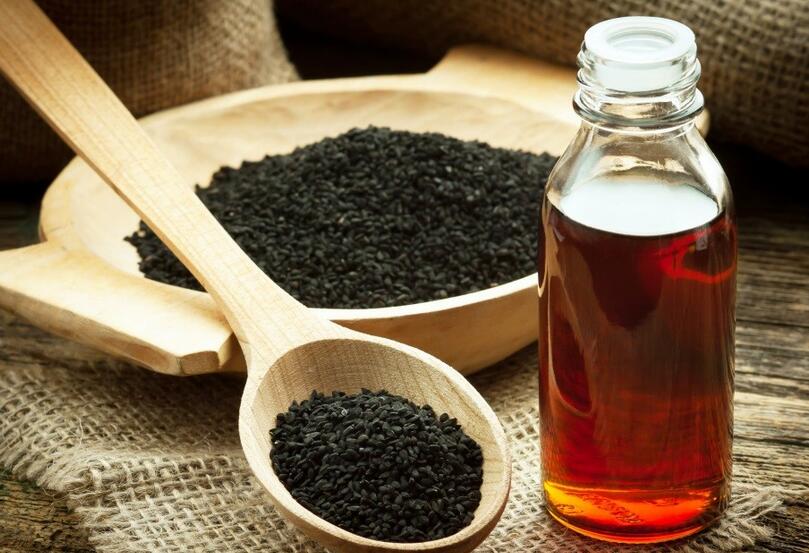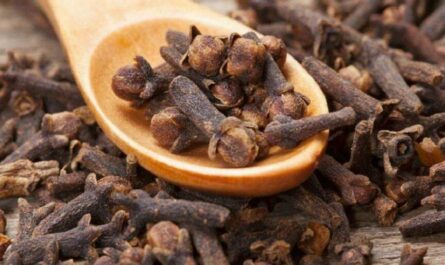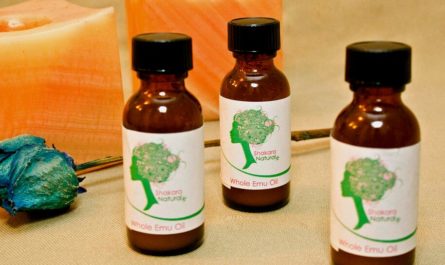The black seed oil has been used for centuries for its medicinal properties. It is extracted from the seeds of the Nigella sativa plant, also known as black cumin. This oil contains beneficial compounds such as thymoquinone, omega-3 and omega-6 fatty acids, and antioxidants.
Studies have shown that black seed oil has numerous health benefits, ranging from reducing inflammation and improving skin to aiding in weight loss. In this article, we will explore the 18 most essential health benefits of black seed oil and how to incorporate it into your diet.
What is Black Seed Oil?
Black seed oil, also known as black cumin seed oil, is derived from the seeds of the Nigella sativa plant. This plant belongs to the ranunculus family and is native to southwestern Asia, the Mediterranean, and Africa. The seeds of the black cumin plant have been used for centuries as a spice and herbal medicine.
Unlike true cumin (Cuminum cyminum), black pepper, black sesame, or black cohosh, the black seed oil is unrelated to these plants. So, make sure not to confuse them with black seed oil.
The health benefits of black seed oil can be attributed to three key natural phytonutrients: thymoquinone (TQ), thymohydroquinone (THQ), and thymol. These phytochemicals are known for their antioxidant and anti-inflammatory properties, which can help protect your body against various diseases.
Nutritional Value of black seed oil
One tablespoon (14 grams) of black seed oil provides:
- Calories: 120
- Total Fat: 14g
- Saturated Fat: 2g
- Monounsaturated Fat: 3g
- Polyunsaturated Fat: 9g
- Omega-3 Fatty Acids: 1.5g
- Omega-6 Fatty Acids: 8g
- Vitamin E: 1.3mg
- Thiamine (Vitamin B1): 0.2mg
- Riboflavin (Vitamin B2): 0.1mg
- Niacin (Vitamin B3): 0.6mg
- Vitamin B6: 0.1mg
- Folate: 8mcg
- Calcium: 52mg
- Iron: 1.8mg
- Magnesium: 105mg
- Phosphorus: 76mg
- Zinc: 0.5mg
These nutrients contribute to the various health benefits associated with black seed oil.

18 Most Significant Black Seed Oil Benefits
Black seed oil contains various nutrients, making it a powerful natural remedy.
1. Combating Diabetes
Black seed oil is a natural remedy shown to help combat diabetes. Researchers from the Indian Council of Medical Research have found that black seed oil can cause partial regeneration of pancreatic beta-cells. This helps to increase insulin concentrations in the body and decrease elevated glucose levels in the blood.
This is significant because black seed oil is one of the few natural substances that can help prevent type 1 and type 2 diabetes. In addition, the oil has also been found to improve glucose tolerance as effectively as metformin. Unlike metformin, black seed oil has very low toxicity and does not cause significant adverse side effects.
2. Balances Cholesterol
Studies have found that black seed oil can help lower LDL cholesterol (also known as “bad” cholesterol) while increasing HDL cholesterol (also known as “good” cholesterol).
In one study, patients with high cholesterol were given black seed oil for six weeks. Their LDL cholesterol levels decreased significantly while their HDL cholesterol levels increased.
The cholesterol-lowering effects of black seed oil are likely due to its high levels of healthy fatty acids, including omega-3 and omega-6. These fatty acids help to reduce inflammation in the body. If you are concerned about your cholesterol levels, adding black seed oil to your diet may be a natural and effective way.
3. Improve Fertility
Black seed oil has been found to have potential benefits for improving Fertility in both men and women. The potential fertility benefits are due to its anti-inflammatory and antioxidant properties. This can help to reduce oxidative stress and inflammation in the reproductive system.
One study found that men who took black seed oil supplements for two months significantly increased sperm count, motility, and morphology compared to those who received a placebo.
In women, black seed oil has been shown to help regulate menstrual cycles and improve ovulation. A study found that women who took black seed oil capsules for two menstrual cycles had significant improvements in their menstrual regularity and ovulation compared to those who received a placebo.
4. Improves Skin Health
Rich in essential fatty acids, antioxidants, and anti-inflammatory compounds, black seed oil is believed to help treat various skin conditions, including eczema, acne, psoriasis, and even vitiligo.
Researchers found that applying a lotion containing black seed oil helped improve symptoms of eczema, such as redness, itching, and inflammation.
The black seed oil also has anti-aging properties. Its high antioxidant content helps protect the skin from damage caused by free radicals, which can accelerate aging.

5. Improves Hair Health
Black seed oil has been used for centuries to promote hair growth and improve health. The high concentration of fatty acids in the oil makes it an ideal hair conditioner, locking in moisture and nourishing the hair follicles.
Studies have shown that black seed oil can help reduce hair loss and promote regrowth. Its anti-inflammatory properties can help reduce scalp inflammation and improve blood circulation to the hair follicles.
In addition, black seed oil can also improve the overall health and appearance of the hair. It can help strengthen the hair shaft, reduce split ends, and prevent premature graying. To use black seed oil for hair health, apply it topically to the scalp and hair or take it orally as a supplement.
6. Help with Weight Loss
Black seed oil has been shown to have potential benefits for weight loss. Studies have revealed that oil can help to decrease body mass index (BMI) and waist circumference.
Black seed oil may also help promote weight loss because of its effects on metabolism. It has been shown to increase metabolism, which can help to burn calories and reduce body weight. In addition, It may also help to reduce cravings and appetite, which can contribute to weight loss.
7. Supports liver health
The liver is an essential organ in the body that processes toxins and plays a crucial role in digestion. Black seed oil can help improve liver function, prevent damage, and protect against liver disease.
In a recent animal study, scientists discovered that black seed oil has a protective effect on the liver. The antioxidant and anti-inflammatory properties help to reduce oxidative stress and inflammation in the liver.
Furthermore, black seed oil can also help to reduce the harmful effects of certain medications, alcohol, and other toxins that can damage the liver. This makes it a potentially valuable supplement for those who have struggled with poor liver function.
8. Help Fight Cancer
Black seed oil has antitumor activity and natural cancer-fighting properties due to its potent phytochemicals and antioxidant capabilities. Research suggests that black seed oil’s bioactive component, thymoquinone, induces programmed cell death in leukemia cells, breast cancer cells, and brain tumor cells.
In an animal model study, researchers found that thymoquinone and thymohydroquinone, two phytochemicals found in black seed oil, resulted in a 52% decrease in tumor cells. Moreover, black seed oil can kill off pancreatic cancer cells and inhibit the development of pancreatic cancer.
9. Helps Treat Infections
Thanks to its powerful antimicrobial and anti-inflammatory properties, black seed oil can help treat various infections.
One study published in the Journal of Ayurveda and Integrative Medicine found that black seed oil can help treat bacterial infections like MRSA. MRSA is a type of bacteria that is resistant to many antibiotics, making it difficult to treat. However, the black seed oil is effective against MRSA, even when other antibiotics fail.
The black seed oil has also been effective against fungal infections like candida. In one study, researchers found that black seed oil was effective against candida strains resistant to commonly used antifungal medications.
10. Boosts Immune System
Black seed oil boosts the immune system due to its potent phytochemicals and antioxidant properties. It can enhance the activity of white blood cells, which fight harmful pathogens and viruses.
A study published in the Journal of Ethnopharmacology found that black seed oil increased the production of natural killer cells. These cells play a crucial role in the body’s defense against cancer and viral infections.
Moreover, black seed oil also contains thymoquinone, which has been shown to have anti-inflammatory and anti-cancer properties. This phytochemical can help to reduce inflammation in the body and lower the risk of chronic diseases such as cancer and heart disease.

11. Reduces high blood pressure
High blood pressure is a common condition that can lead to serious health problems, such as heart disease, stroke, and kidney failure. The active compounds in black seed oil, such as thymoquinone, have been shown to have a relaxing effect on the blood vessels. This can help to reduce blood pressure.
Researchers found that taking black seed oil supplements for eight weeks resulted in significant reductions in both systolic and diastolic blood pressure.
Other studies have also shown that black seed oil can help to improve other risk factors for heart disease, such as cholesterol levels and blood sugar control.
12. Aids in digestion
Black seed oil has been shown to aid digestion due to its anti-inflammatory properties. It can help reduce inflammation in the digestive tract, allowing food to pass through more efficiently. In addition, it can help reduce symptoms such as bloating and gas.
Additionally, black seed oil may help stimulate the production of digestive enzymes. This help improves the body’s ability to break down and absorb nutrients from food. Studies have also shown that black seed oil can help protect the stomach lining from damage caused by alcohol consumption and certain medications.
13. Helps with respiratory conditions
The black seed oil has been used for centuries as a natural remedy for respiratory conditions such as asthma, bronchitis, and coughs.
The oil contains anti-inflammatory, anti-viral, and anti-bacterial properties that can help reduce inflammation and irritation. It can help relax the bronchial muscles, reducing the severity of asthma attacks and making breathing easier.
The oil’s anti-inflammatory properties can also help to reduce inflammation in the nasal passages, making it easier to breathe through the nose. Additionally, black seed oil can help to boost the immune system, which can aid in fighting off respiratory infections and illnesses.
14. Improves brain function
One of the main compounds in black seed oil, thymoquinone, has been shown to have neuroprotective effects, meaning it can help protect the brain from damage and improve cognitive function.
Studies have also found that black seed oil can improve memory and learning and reduce symptoms of anxiety and depression. Additionally, black seed oil may help reduce inflammation in the brain, which has been linked to cognitive decline and neurological disorders.
15. Promotes healthy teeth and gums
Black seed oil is beneficial for oral health. The oil has antibacterial and anti-inflammatory properties that can help prevent and treat gum disease, reduce plaque, and promote healthy teeth and gums.
A study on a group of people with gum disease showed that using black seed oil significantly reduced gum bleeding, plaque accumulation, and gingival inflammation.
The oil’s antimicrobial properties can also help fight the bacteria that cause bad breath. Additionally, black seed oil can aid in the healing of oral sores and promote overall oral health. Regularly using black seed oil for oral care can help maintain a healthy and clean mouth.
16. Prevent Stomach Ulcers
The black seed oil has been shown to have anti-ulcer properties and may help prevent stomach ulcers. One study found that black seed oil effectively reduced the formation of stomach ulcers in rats.
The anti-inflammatory and antioxidant properties of black seed oil are believed to contribute to its ability to protect against stomach ulcers. Additionally, black seed oil may help to promote the healing of existing stomach ulcers.
17. Fighting Superbugs with Black Seed Oil
Superbugs are strains of bacteria and viruses that are resistant to antibiotics and are becoming a significant public health risk. Infections caused by superbugs are difficult to treat and can lead to longer hospital stays, more complicated treatment, and even death.
Research has shown that black seed oil can be a powerful weapon against superbugs. A study conducted by Jawaharlal Nehru Medical College in India found that black seed oil was effective against multi-drug-resistant strains of P. aeruginosa and S. aureus.
The study also revealed that out of 144 strains tested, 97 were inhibited by the oil of black cumin. This is good news for those who are struggling with antibiotic-resistant infections.
18. For Rheumatoid Arthritis
the black seed oil has been shown to possess powerful anti-inflammatory properties that can help reduce the inflammation and pain associated with rheumatoid arthritis. This is partly due to the high concentration of thymoquinone, a compound found in black seed oil that has been shown to have potent anti-inflammatory effects.
In addition to its anti-inflammatory properties, black seed oil has antioxidant properties that can help protect the body’s cells from damage caused by free radicals. This can be especially beneficial for those with rheumatoid arthritis, as oxidative stress has been shown to play a role in the development and progression of the disease.

How to use Black seed oil
There are different ways to use black seed oil, and the dosage may vary depending on the intended use and individual health needs. Here are some common ways to use black seed oil and recommended dosages:
- Topical use: Black seed oil can be applied topically to improve skin health, treat skin conditions such as acne and eczema, and soothe muscle and joint pain. To use topically, dilute a few drops of black seed oil in a carrier oil like coconut or almond oil and apply it to the affected area. The recommended dosage for topical use is 1-2 drops.
- Oral consumption: Black seed oil can be taken orally to support immune system function, reduce inflammation, lower blood sugar levels, and improve digestive health. To consume orally, mix 1-2 teaspoons of black seed oil with food or drink, such as yogurt or smoothies. The recommended daily dosage for oral consumption is 1-2 teaspoons.
- Cooking: Black seed oil can be used in cooking to add flavor and potential health benefits. The recommended dosage for cooking is 1-2 teaspoons.
Potential Side Effects of Black Cumin Seed Oil
Like many natural remedies, it is important to be aware of the potential side effects that may arise from its use.
1. Complications with Pregnancy
If you are pregnant, it is important to avoid black cumin seed oil. This oil has been known to stimulate smooth muscle contraction, including in the uterus, which can lead to premature labor or miscarriage. It is always best to consult your doctor before using new supplements or natural remedies during pregnancy.
2. Blood Pressure
While black cumin seed oil is often praised for its blood pressure-lowering properties, it may not be suitable for everyone. If you are already taking medication for hypertension or have existing heart conditions, it is crucial to talk to your doctor before adding this oil to your health regimen. They can help you determine if it is safe for you to use and advise on proper dosages.
3. Allergic Reactions
Like any other plant-based product, black cumin seed oil can cause allergic reactions in some people. If you have a known allergy to cumin or coriander, you may be more likely to experience skin itchiness, redness, or swelling in topical areas, as well as in the lips, tongue, gums, throat, and face. If you experience these symptoms, stop using the oil immediately and seek medical attention.
4. Gastrointestinal Distress
Black cumin seed oil may cause stomach upset, nausea, vomiting, bloating, and cramping in some people. This is not uncommon for potent oils, but it can still be uncomfortable. If you experience any of these side effects, it may be best to consider other nutrient-dense oils for your natural health treatments.
Conclusion
Black seed oil is a powerful natural remedy with many health benefits. From promoting skin and hair health to supporting the immune system and heart health, black seed oil can help improve overall wellness. However, it is essential to talk to your doctor before taking black seed oil, especially if you have a medical condition.






